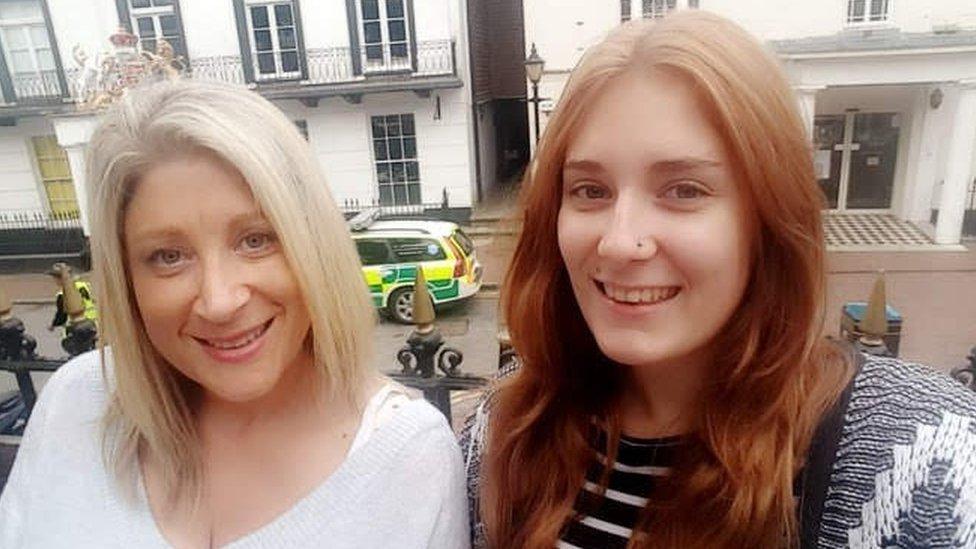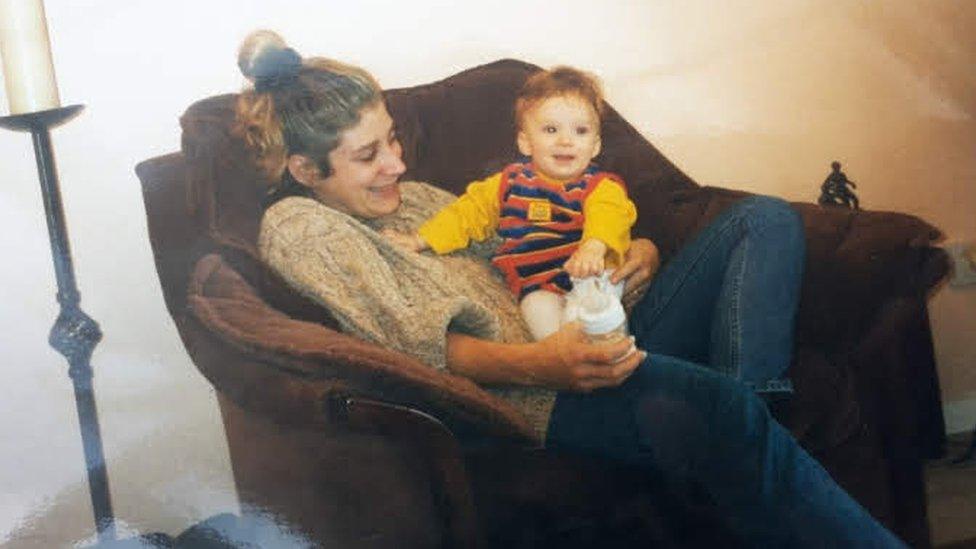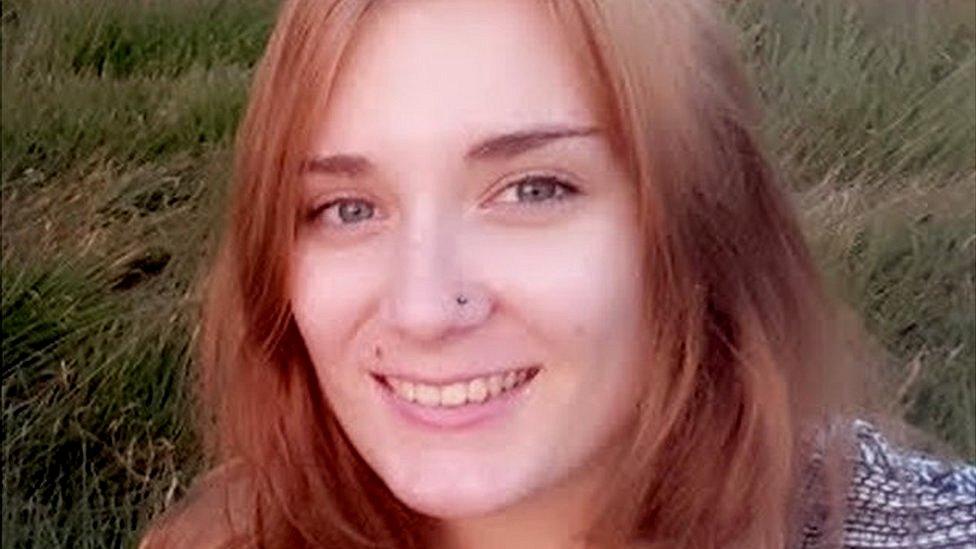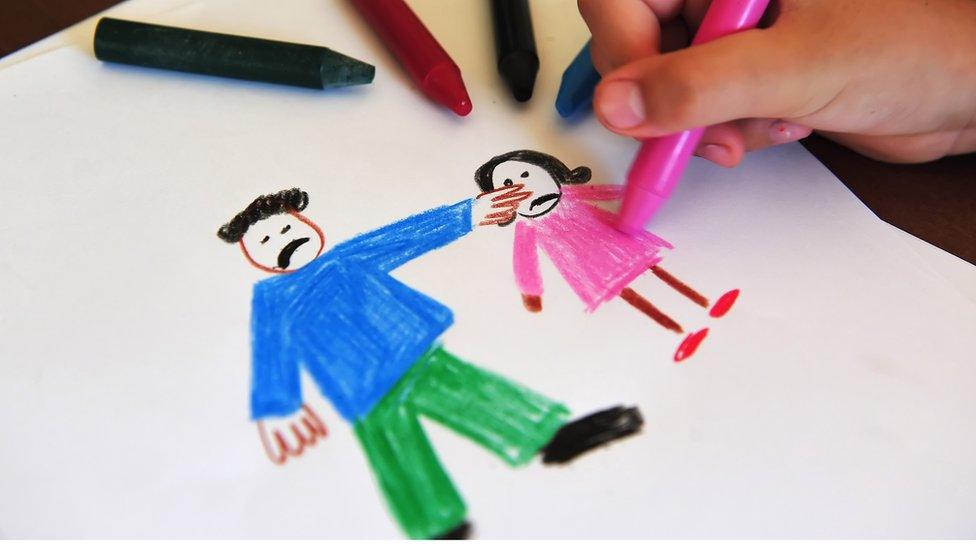Domestic abuse: 'Children are the hidden victims'
- Published

Daisy (R) saw domestic violence from a young age, leading her mother, Charlotte (L), to set up a refuge
"Whenever I go back to the area I grew up, I still feel nervous," says Daisy.
"When I see someone that looks like him, it makes me anxious. And seeing someone driving the red car that he used to drive makes my heart race."
Daisy, now 19, grew up in an environment of domestic violence, with her father abusing her mother.
She says her experiences as a child has left her suffering from anxiety attacks and nightmares.
But Daisy's story is not unique, with the charity Women's Aid estimating that 160,000 children in England are living in homes where they witness domestic abuse.
The charity says it calculates more than 13,400 women and their 14,350 children escaped to a refuge during the year 2016-17.
The issue has prompted the schools watchdog for England, Ofsted, to call for greater awareness, external of how domestic abuse affects children's wellbeing and for more lessons about what constitutes a healthy relationship.
Daisy's parents divorced before she started school but she says coercive control was present in their relationship even after the divorce. She also saw her father assaulting other family members.
Anxiety is something Daisy now struggles with as a young adult, when she does not feel in control either of her body or of a situation - a feeling that stems from childhood.
"When my father first went to prison, I began compulsive hand-washing but I have since been able to keep my anxiety more in check.
"I have had therapy for my anxiety but it is still not 100%. It can be triggered by many things such as men raising their voice or me feeling sick (because my brain sees this as a loss of control in my body).

Daisy as a toddler with her mum
"My dad was always a big drinker and had no control over his temper. My mum worked tirelessly to make sure that he did not lose control, especially not in front of other people.
"She did not want other people to know what was going on behind closed doors perhaps because (just like many other women facing domestic abuse) she was in denial, she would minimise the abuse."
'I had to grow up quickly'
Daisy says visits to her father, after the marriage broke down, were stressful.
"Even as a very young child, I dreaded having to stay at my dad's house. I was always worried about what he was going to do, how much he had had to drink.
"I felt like I had to grow up very quickly because I had to look after my little sister - she was only 13 months younger than me."
A deep sense of anxiety is something 15-year-old Sophie (not her real name) can identify with.
Her mother walked out of the family home with her two children, then aged six and four, after suffering persistent abuse from her husband.
"I remember feeling very upset and very anxious," says Sophie.
"I remember telling my friends, 'I'm moving. I'm not going to be at my old house anymore.'
"It was hard for me. When I moved to a new school, I was very shy and everyone took me as the shy, mysterious girl and I got bullied and everyone excluded me."
What help would Daisy and Sophie have welcomed?
Sophie says a willing, confidential ear would have helped her enormously.
"I definitely think it's really helpful to have someone to talk to. It's somewhere safe.
"I feel the kid's voice should be heard. They're the one who should have a voice. It should be about their needs.
"If kids are going through this, they need someone to listen to them, somewhere that's a safe place."
Daisy, whose mother Charlotte now runs a refuge for affected women, says: "I know that if someone had asked me if I was scared of my dad, I would've said yes.
"I would say to others, 'Don't be afraid to tell someone, to ask your mum to explain what is happening, to tell an adult and ask for help.'"

Daisy says she is working on her anxiety
She also says Ofsted is right that schools should prioritise lessons about what constitutes a healthy relationship.
"I remember when I was at school, there was one day in my whole education dedicated to 'healthy relationships' but the majority of it was about sexual health with very little to do with what a healthy relationship is.
"Everyone should be educated on the signs of control, the signs of abuse in your relationship as well as others.
"They should be told what to do if they think their relationship is unhealthy and what to do if they think someone they know is suffering. I think this awareness will help stop so much suffering."
What do campaigners say?
Katie Ghose, chief executive of Women's Aid, says children are the "hidden victims" of domestic abuse.
"Children not only witness domestic abuse, they experience it. Thousands of children are living in homes filled with fear, frightened of what will happen next.
"Every child deserves support to live free from fear and abuse."
In its report, Ofsted says domestic abuse causes long-term suffering to children.
"More thought needs to be given to how local areas can collectively supply the emotional, psychological and practical support that is needed to help children and victims... get safe, stay safe and move on to reach their full potential."
How is domestic violence defined?
A new law of "controlling or coercive behaviour in an intimate family relationship" came into effect in England and Wales in December 2015.
It targets "any incident or pattern of incidents of controlling, coercive, threatening behaviour, violence or abuse between those aged 16 or over who are, or have been, intimate partners or family members regardless of gender or sexuality".
"The abuse can encompass, but is not limited to: psychological; physical; sexual; financial; and emotional," the law states.
Statistics suggest that some 6.5 million adults in England and Wales have experienced domestic abuse.
Latest statistics, external from the Office of National Statistics show an estimated 8% of women (1.3 million) and 4% of men (695,000) experienced domestic abuse in the past year alone.
- Published19 September 2017
